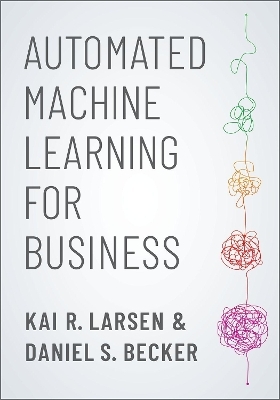
Automated Machine Learning for Business
Oxford University Press Inc (Verlag)
978-0-19-094166-6 (ISBN)
Though the concept of computers learning to solve a problem may still conjure thoughts of futuristic artificial intelligence, the reality is that machine learning algorithms now exist within most major software, including Websites and even word processors. These algorithms are transforming society in the most radical way since the Industrial Revolution, primarily through automating tasks such as deciding which users to advertise to, which machines are likely to break down, and which stock to buy and sell. While this work no longer always requires advanced technical expertise, it is crucial that practitioners and students alike understand the world of machine learning.
In this book, Kai R. Larsen and Daniel S. Becker teach the machine learning process using a new development in data science: automated machine learning (AutoML). AutoML, when implemented properly, makes machine learning accessible by removing the need for years of experience in the most arcane aspects of data science, such as math, statistics, and computer science. Larsen and Becker demonstrate how anyone trained in the use of AutoML can use it to test their ideas and support the quality of those ideas during presentations to management and stakeholder groups. Because the requisite investment is a few weeks rather than a few years of training, these tools will likely become a core component of undergraduate and graduate programs alike.
With first-hand examples from the industry-leading DataRobot platform, Automated Machine Learning for Business provides a clear overview of the process and engages with essential tools for the future of data science.
Kai R. Larsen is an Associate Professor of Information Systems in the division of Organizational Leadership and Information Analytics, Leeds School of Business, University of Colorado Boulder. He is a courtesy faculty member in the Department of Information Science of the College of Media, Communication and Information, a Research Advisor to Gallup, and a Fellow of the Institute of Behavioral Science. Daniel S. Becker is a Data Scientist for Google's Kaggle division and founder of Kaggle Learn and Decision.ai.
Preface
Section I: Why Use Automated Machine Learning?
Chapter 1: What is Machine Learning?
Chapter 2: Automating Machine Learning
Section II: Defining Project Objectives
Chapter 3: Specify Business Problem
Chapter 4: Acquire Subject Matter Expertise
Chapter 5: Define Prediction Target
Chapter 6: Decide on Unit of Analysis
Chapter 7: Success, Risk, and Continuation
Section III: Acquire and Integrate Data
Chapter 8: Accessing and Storing Data
Chapter 9: Data Integration
Chapter 10: Data Transformations
Chapter 11: Summarization
Chapter 12: Data Reduction and Splitting
Section IV: Model Data
Chapter 13: Startup Processes
Chapter 14: Feature Understanding and Selection
Chapter 15: Build Candidate Models
Chapter 16: Understanding the Process
Chapter 17: Evaluate Model Performance
Chapter 18: Comparing Model Pairs
Chapter 19: Interpret Model
Chapter 20: Communicate Model Insights
Section VI: Implement, Document, and Maintain
Chapter 21: Set Up Prediction System
Chapter 22: Document Modeling Process for Reproducibility
Chapter 23: Create Model Monitoring and Maintenance Plan
Chapter 24: Seven Types of Target Leakage in Machine Learning and an Exercise
Chapter 25: Time-Aware Modeling
Chapter 26: Time-Series Modeling
References
Appendix A: Datasets
Appendix B: Optimization and Sorting Measures
Appendix C: More on Cross Variation
| Erscheinungsdatum | 16.06.2021 |
|---|---|
| Zusatzinfo | 186 b/w illustrations |
| Verlagsort | New York |
| Sprache | englisch |
| Maße | 251 x 173 mm |
| Gewicht | 567 g |
| Themenwelt | Informatik ► Theorie / Studium ► Künstliche Intelligenz / Robotik |
| Wirtschaft ► Betriebswirtschaft / Management ► Unternehmensführung / Management | |
| Wirtschaft ► Betriebswirtschaft / Management ► Wirtschaftsinformatik | |
| ISBN-10 | 0-19-094166-9 / 0190941669 |
| ISBN-13 | 978-0-19-094166-6 / 9780190941666 |
| Zustand | Neuware |
| Informationen gemäß Produktsicherheitsverordnung (GPSR) | |
| Haben Sie eine Frage zum Produkt? |
aus dem Bereich


